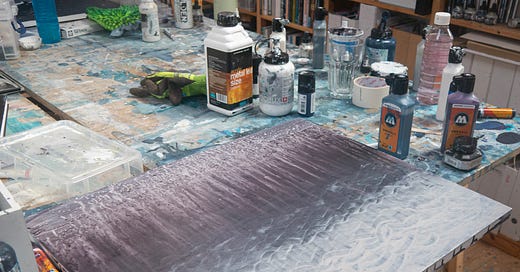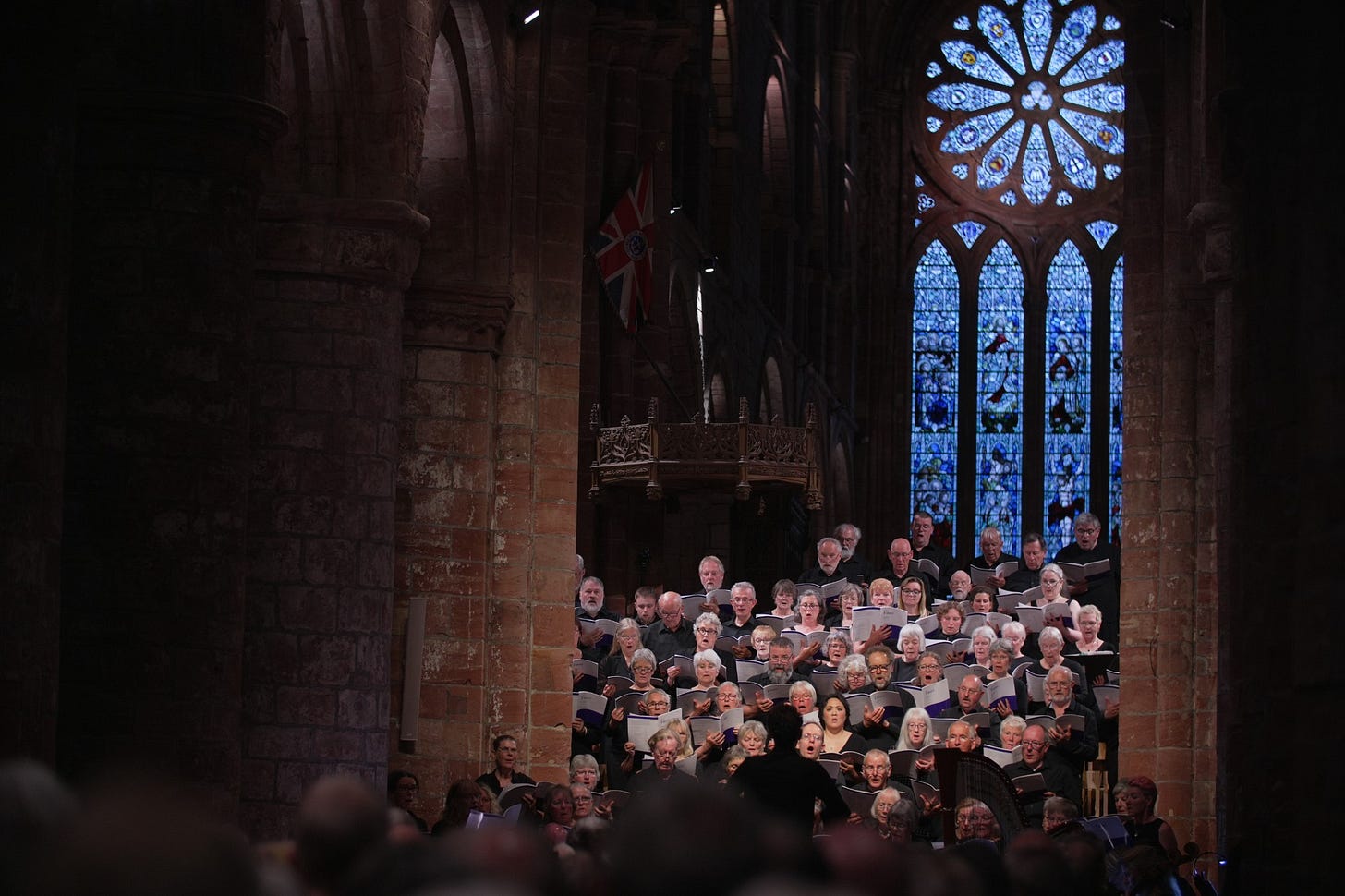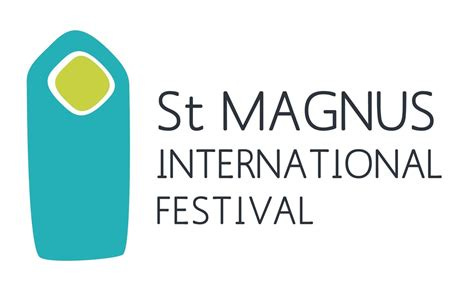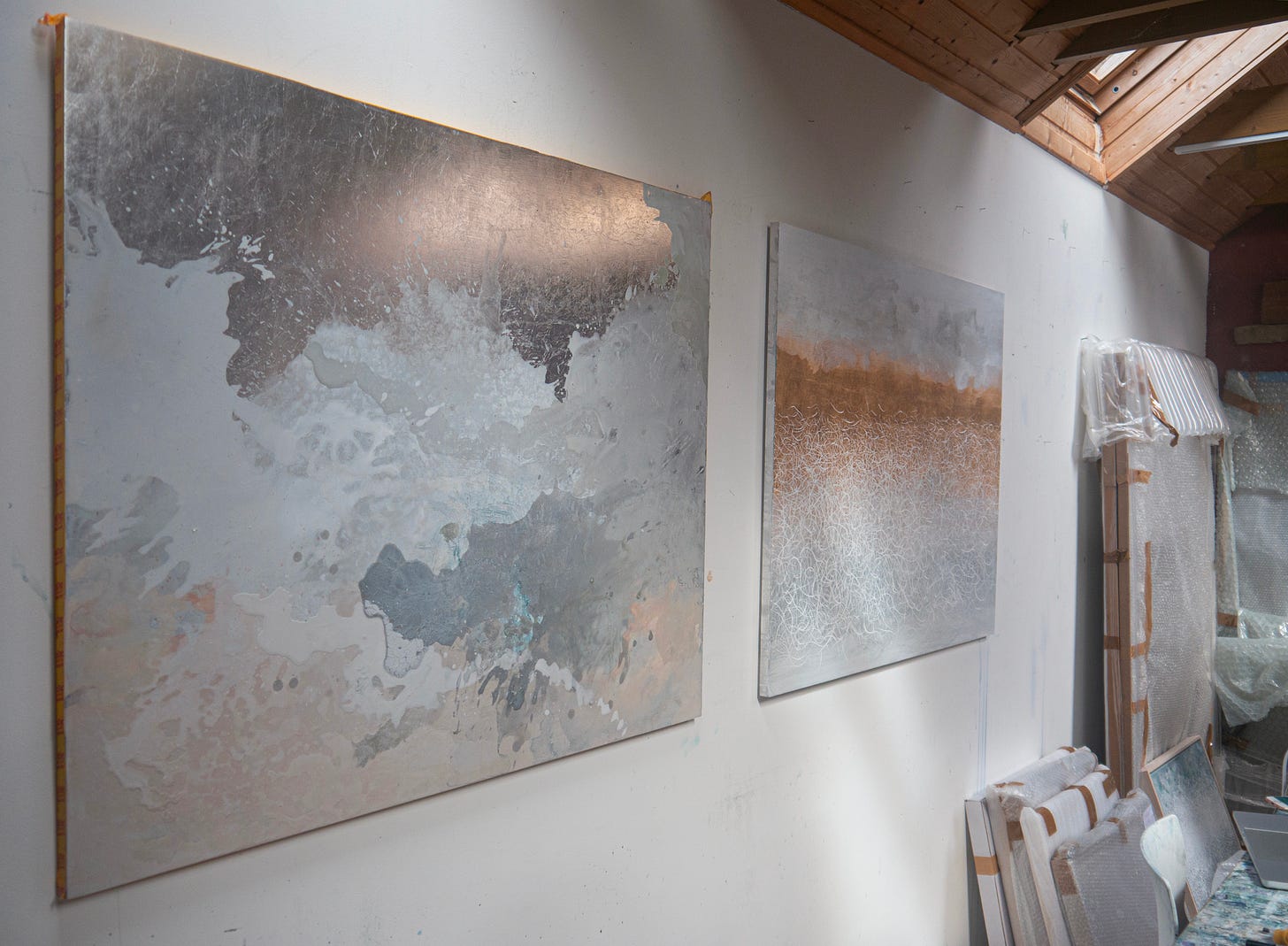Hello friends
Every Spring I travel through to Kirkwall (Orkney’s main town) on Monday evenings for choir practice. We rehearse each week from February through to June for the St Magnus Festival Chorus performance that takes place around Midsummer.
It’s a very special opportunity. A choir comprised of all willing comers, with no audition requirement and no need to read music, is coached through a (sometimes very challenging!) piece of classical repertoire, which we then get to perform with a professional conductor and musicians, occasionally a full orchestra, as part of the annual St Magnus Festival.
The chorus as a whole has been going for as long as the Festival, some 49 years now. I’m still a bit of a newbie, but I’ve got Mozart, Rossini, Vaughan Williams, Fauré and Brahms under my belt, and this year we’re learning Dvorzak’s Mass in D Major.
Learning such challenging music is a full-immersion experience. I can’t sight read music, but I can follow it once I know the tune, my confidence bolstered by following the more experienced sopranos around me. Our director, Graham, patiently coaches us through the score, note by note, section by section.
It can be arduous, but it's worth it all in the end, when I’ve drilled the music into my bones and finally get to lift my voice alongside friends and neighbours, singing out until the ancient cathedral rings like a great stone bell and the midsummer light streams through the stained-glass windows. It’s a joy like no other, all the sweeter for being hard-earned.
Last week we met the professional conductor who will lead us through this year’s final performance, Sarah Latto. With warmth, patience, humour, and absolute rigour, Sarah led us through the score, again and again refining our sound, clarifying our diction, tidying our vowels, correcting our mistakes, sharpening our pitch. Testing phrases again and again, each time with different dynamics, she drew nuances out of the music that made us understand it at a whole new level. We had to watch her with laser focus and total concentration.
“Give me an angry fortissimo”, she said. We roared. Singing loud in the midst of a choir of some eighty-odd voices is a full body experience, a vibrating sound bath, inside and out.
“Great! Now give me a happy fortissimo.” A completely different sound erupted in the room, joyous and effervescent. “This piece” she told us, “needs a happy fortissimo!” The distinction had never occurred to me, but we could all hear what a difference it made and how much better we sounded.
At the end of the session we tottered out, completely spent. It was all in a day’s work for Sarah, who skipped off to catch the overnight ferry, on the first leg of her long trip home. The next time we see each other will be the final rehearsals in June.
What struck me most of all was how much Sarah cared. I don’t mean care in a soft, mushy way. This was a rigorous, tough-minded caring that honoured the music and stretched us beyond what we thought we could deliver. Sarah’s care was for the music, for the performance, and for what we were capable of giving it.
As I drove home listening to more music on the radio, I could hear these musicians’ care too. The diligent, solitary hours of practice, the refusal to settle for ‘alright’, always seeking ways to make it just a bit better. I could hear the care of the composer weighing each note, each cadence, each harmony and setting them on the stave. I could sense the care of the recording engineer, meticulously balancing the complex layers of sound.
And I thought about how all good art is born of this meticulous, rigorous care. The multiple redrafts, the painful edits, the endless tinkering and modification, the difficult decisions that only the writer or artist or musician alone can make, all the sheer stubbornness and patience it takes to make something absolutely as good as you’re capable of making it.
In a conversation at the Edinburgh Book Festival a couple of years ago, the writer Ocean Vuong said this:
"The work of writing is the practice of care, and care is anger improved. I'm at my best as a person and as a writer when I'm finished with my anger. We move from anger to care. Drafting is an act of care. This is what revision and drafting is."
Vuong sees this care as transformational for the artist, not just the art.
I’ve written before about this notion of art as care:
The art that I really love, whatever its medium, is steeped in this work of care. As I engage with it, it feels like I am being cared for too, seen and respected, perhaps challenged, sometimes soothed, always nourished in some way. This work of care doesn’t mean icy perfection. It means that I can tell that every decision has been made deliberately – to polish this surface or to leave this edge rough, that sentence gorgeously flowing or this one disjointed, this narrative fragmented or that plot line tight and pacy.
That care doesn’t end when the work is finished, but is received when the resulting work of art is shared.
This week, as I have been wrestling with a couple of paintings that seem determined to be a bit rubbish, I’ve been leaning on this idea of care. Just as Sarah led us through the tricky corners of the ‘Kyrie’ again and again until we sounded, dare I say it, like a real choir, I can keep on adding, removing, tweaking and adjusting until the questions these paintings are asking of me are at last resolved.
But I do know that when that moment comes, the satisfaction is all the sweeter for having been hard earned.
The Life Raft Co-Creating Community
Sharing is caring! Join us for our weekly creative co-working session on Zoom. It’s very simple. We just say hello at the start and say what we plan to work on and then leave our cameras on and work together in companionable silence. We start at 3pm UK time and finish around 4.30pm. Every Monday I’ll share a recording to the paid subscriber chat.
That’s all for this week!
Sam
You also like…
The cringe stage
Sometimes it feels like there’s a law of entropy at work here, that every piece of creative work we do actively wants to be mediocre, sloppy, woolly, baggy, just plain bad. The only reason there is any good work out there at all is because someone has been diligently tweaking and tinkering, propping it up at every stage of the way.











Well! I’ve just listened to Dvorak’s Mass and that’s going to sound fantastic in your Cathedral. A fitting setting for the collective care you’re all putting into its preparation.
Wonderful! So true. The piece in progress on the table immediately felt like hard rain on the sea...I could hear and feel it... remembering what it's like to be below the surface ...thanks for sharing.